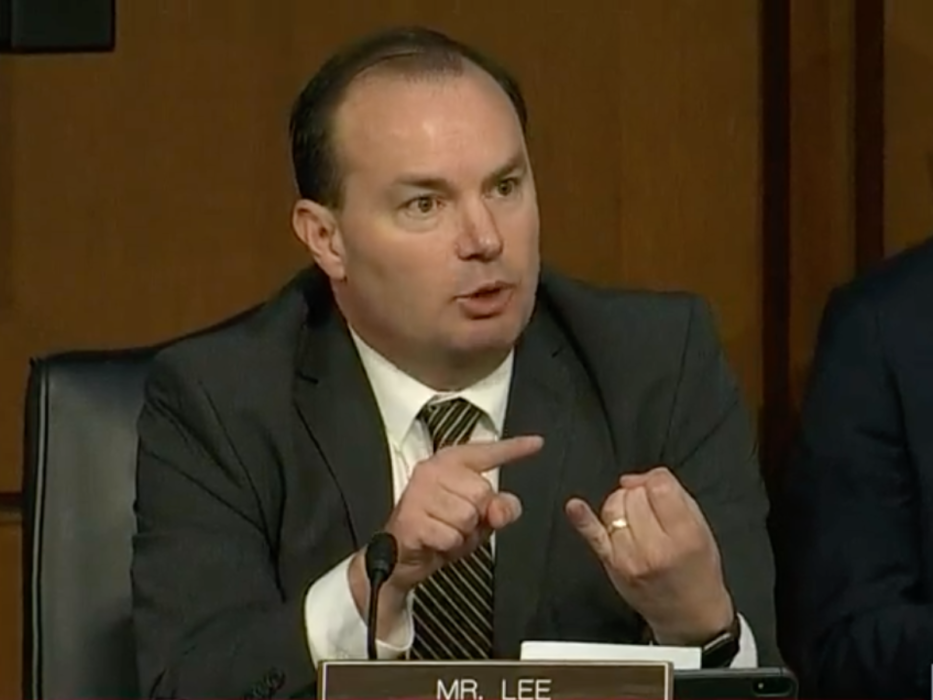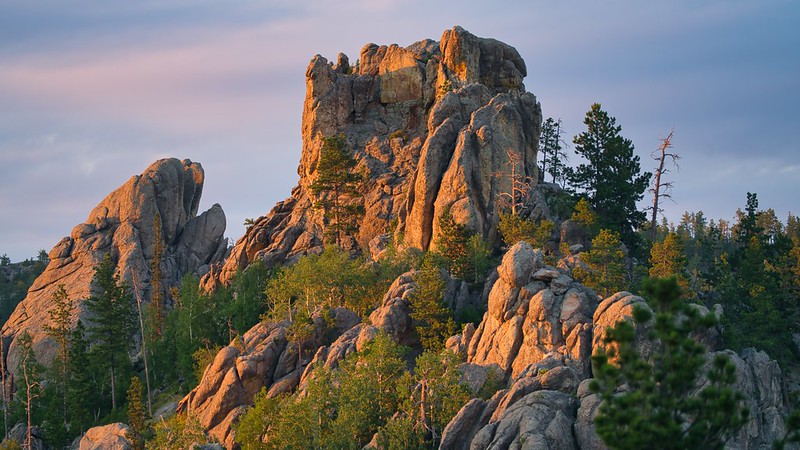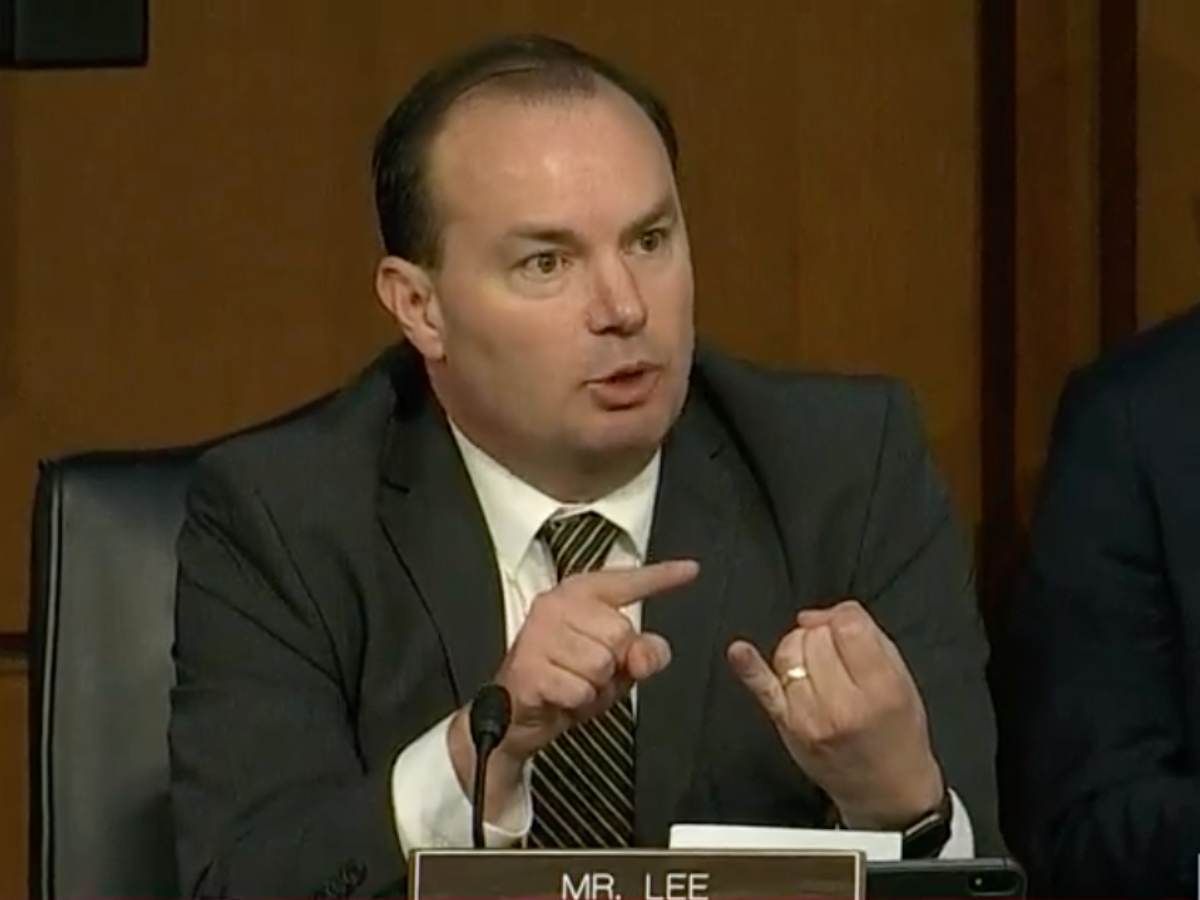
If you, like many Americans, are concerned today about the fate of our democracy, Senator Mike Lee has a message for you: We never had a democracy to begin with. “The word ‘democracy’ appears nowhere in the Constitution, perhaps because our form of government is not a democracy. It’s a constitutional republic,” the Utah Republican tweeted during the October 8 vice presidential debate. Earlier, he caused a stir by tweeting: “Democracy isn’t the objective; liberty, peace, and prospefity [sic] are. We want the human condition to flourish. Rank democracy can thwart that.”
According to Lee, we should instead be worried about too much democracy taking place. “The whole reason to have a constitution is to protect us from the impulse of a majority that might be bent on harming the few in the name of the many,” Lee told new Supreme Court Justice Amy Coney Barrett during her confirmation hearings. Later, on Glenn Beck’s radio show, Lee said that eliminating the electoral college and letting the popular vote decide the presidency would be lunacy. “We’re not a direct democracy,” Lee reminded Beck’s listeners. “Majority rule’s a terrible path to take, because it always leads to tyranny.”
It’s unclear what the future of the Republican party holds after President Donald Trump leaves office, whether he wins today’s election or not. Some foresee a return to the party’s free-trade and fiscal-conservatism roots, while others think Trump’s race-baiting populism will prevail. But these debates ignore the fact that one issue unites both mainstream Republicans and Trump’s acolytes, and it’s the very thing Mike Lee has been talking about ad nauseum: diluting democracy.
This story first appeared in the Bitterroot Newsletter. Sign up below to receive our latest reporting right in your inbox.
Since 2010, the Republican party has gerrymandered state and federal legislative maps to such an extent that they can utterly dominate certain state legislatures without winning a majority of votes. Congressional districts across the South have been tossed out for corralling black voters in such a fashion as to render their votes worthless, and GOP governors have signed strict voter-ID laws in recent years.
This aversion to the very act of voting has been obvious during the pandemic. President Trump has assailed the reliability of mail-in voting, has falsely claimed widespread voter fraud exists, and has called on supporters to show up at polling locations to monitor activity — a veiled solicitation of voter intimidation. Meanwhile, Republicans are limiting access to drop-off locations for mail ballots, and have already begun trying in court to end the count of mail-in votes early.
Undemocratic as all of this may seem, it’s consistent with the vision of a constitutional republic as laid out by folks like Mike Lee. When Lee tweeted in October that America is not a democracy, it seems he was referring to a direct democracy. That’s a system in which all policies are voted on by the electorate, much like the initiatives and referendums you may have seen on your own ballot this year.
This, of course, is not how the U.S. government works, and nobody is calling for the implementation of such an inefficient form of legislating. Yet Lee talks like there’s an omnipresent threat of — well, the threatening action is not clear, but oppression will surely follow in Lee’s telling. This amorphous logic justifies a host of democracy-limiting measures such as gerrymandering, challenging the Voting Rights Act, or ending an election before all votes are counted.
You might dismiss Trump trying to sway an election as just Trump being Trump. But Lee represents a different branch of the same tree, one that could legitimize these views for years to come.
Republicans “are saying we must crush our enemies because we are right,” Matthew Sitman, associate editor of the Catholic political site Commonweal, told On the Media. “That move from democracy to simply saying we’re right is the essential thing. You can see a situation arising in which Republicans keep trying to hold onto power despite not being a majority. And my concern is that these conservative intellectuals are creating the conditions, are giving themselves permission to go along with what amounts to authoritarian rule by a political party that doesn’t have anywhere close to the support of a majority of Americans.”
Mike Lee — senator, former clerk for Samuel Alito, son of Ronald Reagan’s solicitor general — is one such conservative intellectual. But there are terrifying holes in his logic, ones that allow for leaders like Donald Trump to arise and, potentially, amass immense power. For one, a constitutional republic is not a unique American form of government. “Russia and North Korea are both ‘republics’ according to their constitutions,” Christine Adams, a historian at St. Mary’s College of Maryland, wrote in a 2018 Baltimore Sun op-ed. “They have elections. They have institutions that their constitutions delineate. However, most Americans would not consider those governments legitimate. Only underlying democratic norms provide legitimacy to a constitutional republic.”
Lee is quite open about his disdain for “majority rule,” and that could be because America’s political system gives his minority an outlandish amount of power. Utah and California both have two senators, even though California has 13 times the population. Lee is a textualist and originalist, meaning he believes the constitution should be interpreted word-for-word, as the founders intended them to mean at the time the document was written. Nevermind the document’s authors were all white men who intended only for white men to vote, and that many enslaved people. (I imagine there were originalists who were quite opposed to the Fifteenth Amendment.) Lee, not surprisingly, is on Trump’s shortlist to fill vacancies on the Supreme Court, one path Republicans have banked on to preserve minority rule.
Speaking to Glenn Beck, Lee argued that the founding fathers “sought to mediate, at every step, the implications of mob rule.” Lee brings up “mob rule” quite often, but he does so in a fashion that muddies the difference between a mob and a majority. Majority rule, when arrived upon democratically, is not a mob — it’s utilitarian and, as any kindergarten class could tell you, fair. Nobody considers voting a mob activity.
Nobody, it seems, except for Mike Lee. Surely this is a bit of a marketing ploy; one must assume a textualist intellectual like Lee would check the text of a dictionary before using a term like “mob rule” so often. Mob rule is when a small group of fringe outsiders control the masses, often utilizing intimidation tactics.
Mike Lee’s strain of Republicanism isn’t meant to thwart mob rule. Its goal is to maintain it.
Good journalism needs reader support
Worth a Read
Top stories from around the West
The final forecasts of key Western races from FiveThirtyEight:
- Biden has a 68 percent chance of winning Arizona, the West’s purplest state.
- Democrat Mark Kelly’s odds of beating Martha McSally in Arizona’s Senate contest are 78 percent.
- Former Governor John Hickenlooper has an 84 percent shot of toppling incumbent Republican Senator Cory Gardner in Colorado.
- Republican Steve Daines is favored to hold his Senate seat in Montana, where he’s being challenged by Governor Steve Bullock.
•••
Stanford researchers, the Los Angeles Times reports, estimate that 18 Trump campaign rallies have yielded an extra 30,000 coronavirus cases and 700 deaths. The president packs hundreds into these events, and openly mocks the wearing of masks.
•••
Ranked choice voting in Alaska. Ditching the popular vote in Colorado. Restoring voting rights to Californians on parole. These are ballot measures to watch.
•••
The Washington Post compiled a list of 125 environmental regulations the Trump administration has axed or rolled back over the last four years. Regardless of where you land on the political spectrum or how concerned you are about the environment, this is an unnerving sign of our whiplash style of regulation: One president establishes rules, the next rolls them back, and back and forth it goes.
•••
As COVID-19 surges through Wyoming, public-health experts were heckled during a county commission meeting. The meeting, during which a mask mandate was being considered, was cut short.
Have a friend who loves the West? They’ll love this newsletter.
Your Land
An ode to the public lands we share

Share with a friend | Watch a (bob)cat video | View previous newsletters

